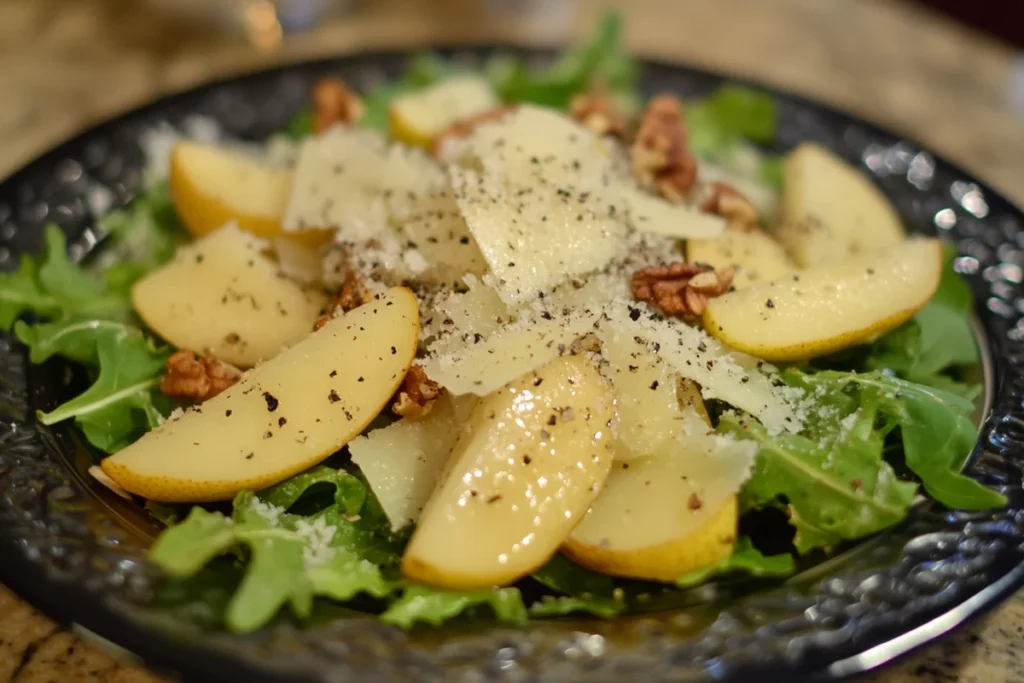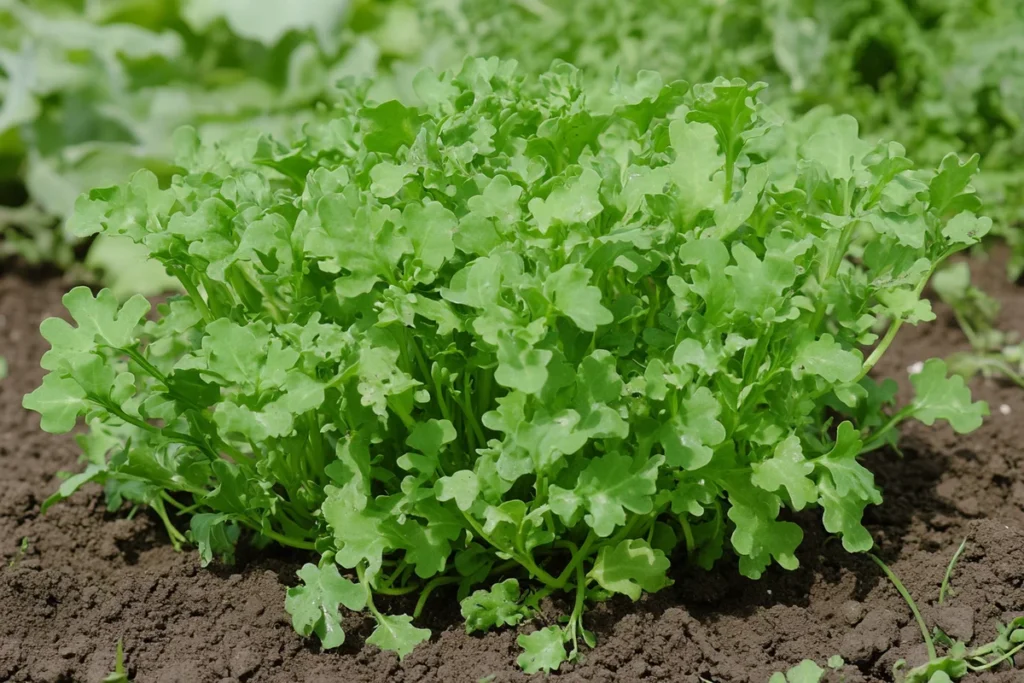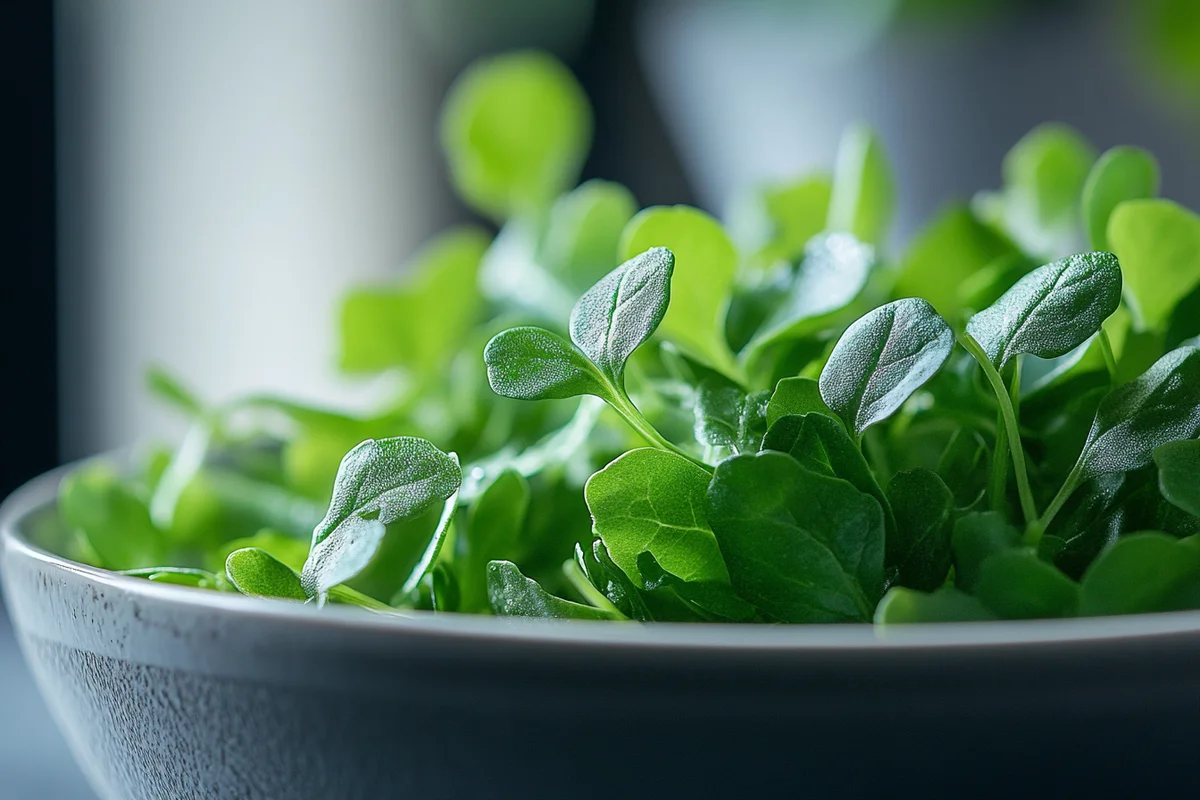Introduction to Rocket in a Salad
What Is a Rocket in a Salad?
Rocket, often called arugula in North America, is a leafy green vegetable that belongs to the Brassicaceae family, which also includes broccoli, kale, and mustard greens. This vibrant, peppery-flavored green has been a staple in Mediterranean and European cuisines for centuries. The term “rocket” itself originates from the Italian word rucola, which later transformed into “roquette” in French before evolving into its English counterpart.
What makes rocket so special is its distinctive flavor profile – a slightly bitter, spicy kick that stands out among other salad greens. Its unique taste can elevate even the simplest salads, making it a popular choice for chefs and home cooks alike. Beyond its flavor, rocket is a nutritional dynamo, packed with essential vitamins, minerals, and antioxidants that support overall health.
Why Is Rocket Popular in Salads?
There’s something undeniably appealing about the versatility of rocket in salads. For starters, its crisp yet tender texture creates a satisfying base or topping for countless dishes. But that’s just scratching the surface!
The peppery flavor of rocket pairs beautifully with a variety of ingredients – from creamy dressings and cheeses like Parmesan to sweet fruits like pears and apples. This green isn’t just about taste; it’s also about the visual and textural balance it brings to a plate. Its vibrant green hue brightens up any salad, while its slight bitterness contrasts delightfully with sweeter or tangier components.
Rocket’s popularity isn’t just limited to Europe. It has found its way into global cuisines, especially those influenced by the Mediterranean diet. It’s hard to resist a simple yet elegant rocket salad drizzled with lemon vinaigrette or tossed with nuts and dried cranberries for a touch of sweetness.
In short, rocket’s adaptability, distinctive taste, and healthful qualities make it a go-to choice for salads, whether served as a side or the main attraction.

The Science and Nutrition of Rocket
Nutritional Profile of Rocket
When it comes to nutrient density, rocket punches well above its weight. Despite its delicate, leafy appearance, this salad green is a powerhouse of essential nutrients that are incredibly beneficial for overall health. Let’s take a closer look at what makes rocket a nutritional star.
Rocket is impressively low in calories, making it an excellent choice for those watching their caloric intake. One cup of fresh rocket contains only about 5 calories, making it a guilt-free addition to meals. Beyond being low in calories, it’s also a great source of fiber, which aids digestion and helps you feel full longer.
In terms of vitamins, rocket shines brightly. It’s packed with vitamin K, which is essential for bone health and blood clotting. A single serving provides over 50% of the recommended daily intake for this vitamin. It’s also rich in vitamin C, a potent antioxidant that boosts the immune system and supports skin health, as well as vitamin A, which promotes good vision and a healthy immune response.
Minerals are another area where rocket excels. It contains calcium, which supports strong bones and teeth, and magnesium, which aids in muscle function and energy production. Potassium, another key mineral in rocket, helps regulate blood pressure and supports heart health.
In addition to vitamins and minerals, rocket boasts a wealth of phytochemicals, including glucosinolates, which have been studied for their potential anti-cancer properties. It’s also a source of lutein and zeaxanthin, antioxidants known for their role in protecting eye health. With all these nutrients packed into a single leafy green, it’s no wonder that rocket is considered a superfood.
Health Benefits of Eating Rocket
Beyond its stellar nutrient profile, rocket offers an array of health benefits that make it a valuable addition to any diet. Here’s how this leafy green can positively impact your well-being:
- Supports Digestive Health: The high fiber content in rocket helps promote healthy digestion. Fiber adds bulk to stool, supports regular bowel movements, and feeds beneficial gut bacteria, contributing to better gut health overall.
- Boosts Heart Health: Rocket’s impressive levels of potassium and magnesium play a crucial role in maintaining healthy blood pressure levels. Additionally, its antioxidants help reduce oxidative stress and inflammation, which are major contributors to heart disease.
- Enhances Immune Function: With a generous dose of vitamin C, rocket supports your immune system by encouraging the production of white blood cells, which fight off infections.
- Strengthens Bones: The high vitamin K content in rocket is essential for bone mineralization and reducing the risk of fractures. Vitamin K also works synergistically with calcium to maintain bone density, especially in older adults.
- Provides Anti-Inflammatory Benefits: The antioxidants and phytochemicals in rocket help combat inflammation, which can reduce the risk of chronic conditions like arthritis and diabetes.
- May Offer Cancer-Fighting Properties: The glucosinolates in rocket break down into compounds that may help protect against certain types of cancers, including lung and colon cancers, according to emerging research.
With all these benefits, it’s clear that rocket is much more than just a tasty salad ingredient – it’s a health-boosting green that can significantly enhance your diet. Whether you’re aiming to improve digestion, support heart health, or just add a flavorful punch to your meals, rocket has you covered.
Culinary Uses and Pairings
Common Recipes Featuring Rocket in Salads
Rocket’s versatility in the kitchen is nothing short of remarkable. This peppery green can transform a salad from bland to gourmet with its vibrant flavor and ability to pair seamlessly with both sweet and savory ingredients. Whether you’re making a simple weekday meal or preparing an elegant dish for guests, rocket is always up to the task.
One of the most beloved ways to enjoy rocket is in a classic rocket and Parmesan salad. Imagine a bed of fresh, crisp rocket leaves drizzled with a tangy lemon vinaigrette and topped with shavings of nutty Parmesan cheese. The combination of the peppery greens, sharp citrus, and rich, salty cheese is nothing short of perfection. Add some toasted pine nuts for extra texture, and you’ve got a salad that’s as simple as it is satisfying.
If you’re feeling adventurous, try pairing rocket with fruit! A rocket and pear salad is a delightful mix of sweet and spicy flavors. Toss some thinly sliced pears, crumbled blue cheese, and candied walnuts with rocket, and finish it off with a drizzle of honey mustard dressing. The natural sweetness of the pears complements the peppery kick of the rocket, creating a flavor profile that’s both refreshing and sophisticated.
Another crowd favorite is a Mediterranean-inspired rocket salad with cherry tomatoes, olives, and cucumbers. Add a sprinkle of feta cheese and a splash of olive oil, and you’ve got a salad that transports your taste buds straight to the Mediterranean coast.
These are just a few of the endless possibilities. Rocket truly shines when paired with fresh, high-quality ingredients, making it a staple for salads around the world.

How to Use Rocket Beyond Salads
While rocket is undoubtedly a salad superstar, it’s by no means limited to leafy bowls. This versatile green can be used in a variety of dishes, adding its signature peppery flavor to everything from appetizers to main courses.
For instance, why not try making a rocket pesto? Traditional pesto recipes often use basil, but substituting rocket creates a bold, tangy version that pairs wonderfully with pasta or grilled chicken. Blend rocket leaves with garlic, olive oil, Parmesan cheese, and pine nuts, and you’ve got a zesty spread that’s both unique and delicious.
Rocket also makes a fantastic topping for sandwiches and wraps. Layer it onto a turkey or chicken sandwich for a spicy, fresh bite, or add it to a veggie wrap for an extra punch of flavor. It’s a great alternative to lettuce if you’re looking for a green with a bit more character.
Pizza lovers can rejoice too! Rocket-topped pizzas are a staple in many European kitchens. After baking a pizza, simply scatter fresh rocket leaves over the top. The slight bitterness of the greens balances beautifully with the richness of melted cheese and savory toppings like mushrooms or roasted peppers.
And let’s not forget pasta dishes. Tossing fresh rocket into a warm pasta dish just before serving adds a wonderful, wilted texture and a vibrant flavor. Combine it with cherry tomatoes, garlic, and olive oil for a simple yet satisfying meal.
From pesto to pizza, rocket proves that its culinary applications extend far beyond the salad bowl. With a little creativity, you can incorporate this leafy green into just about any dish!
Growing and Buying Rocket
How to Grow Your Own Rocket
Growing rocket at home is not only rewarding but also surprisingly easy, even for those who don’t consider themselves green thumbs. Rocket is a fast-growing, low-maintenance plant that thrives in various climates, making it an ideal choice for beginners and experienced gardeners alike. Here’s how you can grow your own fresh and flavorful rocket at home.
To start, you’ll need a sunny spot in your garden or a container if you’re short on space. Rocket prefers well-draining, fertile soil and can tolerate a little shade, although it grows best in full sun. The seeds are tiny, so be gentle when planting them. Sow the seeds about 1 cm deep and 10 cm apart in rows. Keep the soil moist but not waterlogged, as overly wet conditions can lead to root rot.
One of the best things about rocket is its rapid growth. You can expect the first tender leaves to appear within 7–10 days of planting. Within 4–6 weeks, your rocket will be ready for harvesting. You can either pick the outer leaves as needed, allowing the inner leaves to continue growing, or harvest the entire plant.
If you’re growing rocket in the cooler months, it will flourish without much effort. However, in warmer weather, rocket may bolt – meaning it will start flowering and produce bitter-tasting leaves. To prevent this, plant your seeds in early spring or late summer for the best results.
When it comes to keeping your rocket fresh after harvesting, treat it like any other salad green. Wash the leaves gently, pat them dry, and store them in an airtight container or bag in the fridge. With just a bit of care, you’ll have a steady supply of rocket to enjoy in your salads, sandwiches, and beyond!

Tips for Buying Fresh Rocket
For those who prefer the convenience of store-bought rocket, knowing how to select the freshest greens is essential. Here are some tips to help you choose the best rocket at your local market or grocery store.
When shopping, look for rocket leaves that are vibrant green and free of yellowing or browning. The leaves should feel crisp to the touch, not limp or soggy. If the rocket is sold in bags or containers, check for excess moisture or condensation, as this can cause the greens to spoil quickly.
Another tip is to opt for organic rocket whenever possible. Organic options are typically free from synthetic pesticides and fertilizers, which many people prefer for both health and environmental reasons. While they might be slightly pricier, the quality and taste often make up for the difference.
To store your rocket after purchasing, wrap it in a slightly damp paper towel and place it in a sealed container in the fridge. This will help maintain its crispness and flavor for up to a week. However, since rocket is highly perishable, it’s best to use it as soon as possible to enjoy its full freshness and nutritional benefits.
Whether you’re growing it at home or picking it up from the store, rocket is an easy and accessible way to add a nutritious and flavorful boost to your meals.
Cultural and Regional Perspectives
Rocket’s Role in Different Cuisines
Rocket, with its distinctive peppery kick, has made its way into various cuisines around the world, often playing a key role in regional dishes. Its versatility allows it to shine in everything from Mediterranean classics to modern fusion recipes, proving that this humble green knows no borders.
In Mediterranean cuisine, rocket is a cornerstone ingredient. It frequently appears in fresh, vibrant salads paired with ingredients like sun-dried tomatoes, olives, cucumbers, and feta cheese. One popular example is a Greek-inspired rocket salad, where rocket’s sharpness balances the briny flavors of olives and feta. You’ll also find it drizzled with extra virgin olive oil and a squeeze of fresh lemon juice, emphasizing simplicity while delivering bold flavors.
Italian cuisine celebrates rocket in its own unique way. Known as rucola in Italian, this green often tops pizzas or gets mixed into warm pasta dishes. For example, a classic Italian rocket salad features Parmigiano-Reggiano shavings, toasted pine nuts, and a balsamic glaze. It’s a dish that exemplifies how rocket can stand out with minimal ingredients.
Moving north, in French cuisine, rocket is often featured in lighter dishes, such as a rocket and goat cheese tart or as a garnish for roasted meats and fish. It’s valued for its ability to cut through richer flavors, offering a refreshing contrast.
Rocket is also gaining popularity in Middle Eastern and Indian cuisines. Its bold flavor pairs well with spiced dishes, providing a cooling element to contrast the heat. For instance, rocket is often added to flatbreads, pilafs, or even served as a fresh accompaniment to curries.
These global applications of rocket highlight its adaptability and widespread appeal. Whether it’s Mediterranean simplicity or fusion-inspired creativity, rocket continues to captivate chefs and food lovers worldwide.
Arugula vs. Rocket: Is There a Difference?
If you’ve ever wondered whether arugula and rocket are the same thing, you’re not alone. The short answer? Yes, they are. But the story behind the terminology is worth exploring.
The term rocket is primarily used in British and Australian English, while arugula is the name you’ll hear in the United States and Canada. Both names refer to the same plant, Eruca vesicaria, a member of the mustard family. The difference lies in regional language preferences.
The word “rocket” originates from the Italian term rucola, which made its way into French as roquette and then into English as “rocket.” Meanwhile, the term arugula comes from an Italian dialect variation of the same word, which was adopted by American English speakers.
Despite the different names, the plant itself is identical. The flavor, nutritional benefits, and uses remain consistent no matter what you call it. However, there are regional differences in how it’s prepared and served. In Europe, for instance, rocket is often used raw in salads, whereas in the U.S., arugula frequently makes an appearance in cooked dishes like pasta or soups.
So, whether you call it rocket or arugula, this leafy green remains a global favorite, celebrated for its spicy bite and culinary versatility.
FAQs About Rocket in a Salad
What does rocket taste like?
Rocket has a unique flavor profile that sets it apart from other leafy greens. Its taste is often described as peppery, spicy, and slightly nutty. The sharpness of rocket can vary depending on its freshness and maturity. Younger leaves tend to have a milder, more delicate flavor, while older leaves pack a bolder, more pungent punch. This peppery zing is what makes rocket such a standout ingredient, adding depth and excitement to salads and other dishes.
Is rocket good for weight loss?
Yes, rocket is an excellent addition to a weight-loss-friendly diet. It’s low in calories—just 5 calories per cup—and high in fiber, which helps keep you feeling full for longer. This combination makes it a fantastic option for those trying to manage their weight without compromising on nutrition. Additionally, rocket is rich in vitamins and minerals that support overall health, so you’re not just cutting calories; you’re fueling your body with essential nutrients.
Can you eat rocket raw?
Absolutely! In fact, eating rocket raw is one of the best ways to enjoy its fresh, peppery flavor. Rocket is a staple in raw dishes, particularly salads, where its crisp texture and sharp taste shine. However, you can also toss raw rocket into sandwiches, wraps, or even smoothies for a nutrient boost. If the peppery taste feels too strong, you can pair it with sweeter ingredients like fruits or mild dressings to balance out the flavors.
What are the side effects of eating too much rocket?
While rocket is generally safe and healthy, eating it in excessive amounts could cause some minor side effects. Because rocket is high in vitamin K, which plays a role in blood clotting, it may interfere with blood-thinning medications like warfarin. If you’re on such medications, it’s best to consult your healthcare provider before consuming large amounts of rocket. Additionally, its high fiber content might cause digestive discomfort, such as bloating or gas, if consumed in excessive quantities.
Is rocket suitable for kids?
Yes, rocket is perfectly safe for kids, though its strong peppery taste might not appeal to all children. Younger leaves, which are milder in flavor, may be a better option for introducing rocket to kids. You can mix rocket with other leafy greens or add it to familiar dishes like pasta or sandwiches to make it more appealing. Encouraging kids to try rocket is a great way to diversify their palate and provide them with a nutrient-rich vegetable.
How can you balance the peppery flavor of rocket in a salad?
If you find rocket’s peppery taste too intense, there are several ways to balance it. Pairing it with sweet ingredients like sliced pears, apples, or dried cranberries can offset the spiciness. Creamy elements such as avocado, goat cheese, or a yogurt-based dressing also work well to mellow out its bold flavor. Adding a splash of citrus, like lemon or orange juice, can bring a refreshing acidity that complements rocket beautifully. Experimenting with these combinations can help you create a perfectly balanced salad that suits your taste.
Conclusion
Summing Up: Why Rocket Is a Must-Try Salad Ingredient
To sum it up, rocket is far more than just another salad green—it’s a dynamic, nutritious, and flavorful addition to any meal. Its sharp, peppery bite brings life to salads, while its impressive nutrient profile supports overall health. From being packed with vitamins like A, C, and K to offering antioxidants and anti-inflammatory properties, rocket truly earns its status as a superfood.
Not only is rocket versatile in the kitchen—shining in salads, sandwiches, pasta, and even pesto—but it’s also easy to grow at home and readily available in stores. Its cultural significance across Mediterranean, European, and global cuisines further showcases its universal appeal. Whether you know it as rocket or arugula, this leafy green deserves a spot in your diet.
So why not give it a try? Whether you’re crafting a simple lemon-dressed rocket salad, blending it into a bold pesto, or sprinkling it over a pizza, rocket will bring a fresh and exciting element to your dishes. It’s time to embrace this leafy green and let it elevate your meals!

